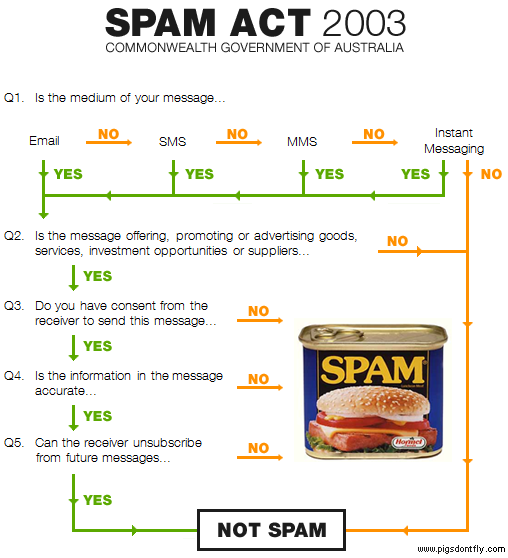19 October 2008 Spam Acting Up
Bigpond started using Twitter. At first they sucked. But it appears they’ve listened and turned things around. However during this process some legal implications were raised, specifically the Spam Act 2003.
After research of my own, speaking to the Australian Communications and Media Authority and getting in touch with Dr Melissa de Zwart from the Faculty of Law at Monash University, I have summarised the results…

Prior to my research I questioned whether this legislation might also include things like commenting on a blog or writing on my Facebook wall. However it is clear the Act does not cover this. Next I looked at something like Facebook Chat and whether this could be considered an Instant Message, however becoming friends with the brand would be adequate consent with the ability to defriend them acting as an unsubscribe option.
So this leaves two areas which are questionable. Sending a private message on Facebook, if considered an email, and replying to a user on Twitter who is not following you, if considered instant messaging.
According to Dr Melissa de Zwart, this is irrelevant as the Terms of Service by the hosting party cover this type of third party communication. You agree to these terms when you sign up.
So should brands be worried about any legal implications of the Spam Act 2003 when it comes to social media marketing?
No. Not at all.
But Dr Melissa de Zwart did suggest the definition of “spam” could do with an update.

Stan Lee
Posted at October 19, 2008 7:06pm, 19 OctoberThe Dr has a point. I believe there are 2 types of spam.
#1. Unwanted, unsolicited junk.
#2. The stuff you’ve signed up for but don’t have the time to read ie: newsletters etc.
Rick Clarke
Posted at October 20, 2008 12:08am, 20 OctoberOf course, if it doesn’t get classified as SPAM by the SPAM Act, but would still annoy the person receiving it, its not a good idea to send it…
Gavin Heaton
Posted at October 20, 2008 12:28am, 20 OctoberI agree with Rick … just because a communication doesn’t fall under the legislation, it doesn’t mean that it isn’t considered SPAM by the recipient. Marketers need to think about the perception of the recipient before sending and ALSO consider the consequences of their reaction. Remember, it is a two-way conversation now … and initiating a conversation can lead you into places that you may be unwilling or unprepared for.
If in doubt … reach out to an active social media marketer/consultant. It’s like insurance against saying the wrong thing in the wrong place at the wrong time.
Zac Martin
Posted at October 20, 2008 1:53am, 20 October@ Rick and Gavin
Of course. I’m just sick of brands trying to use the legal department as an excuse as to why they aren’t involved in social media conversation.